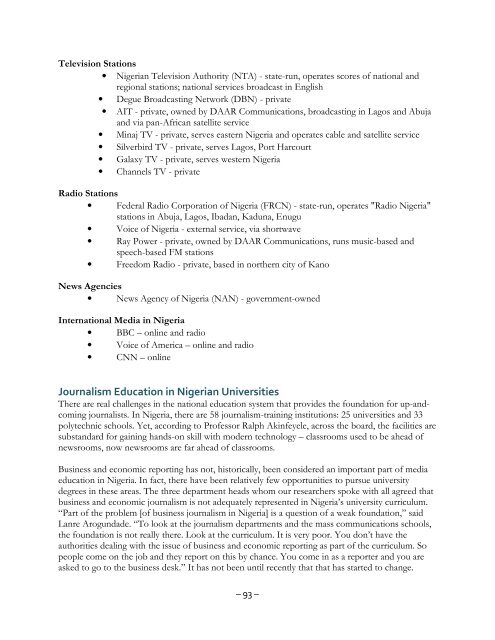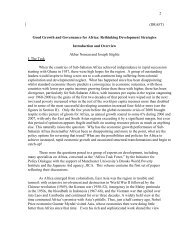THERE WILL BE INK - Initiative for Policy Dialogue
THERE WILL BE INK - Initiative for Policy Dialogue
THERE WILL BE INK - Initiative for Policy Dialogue
Create successful ePaper yourself
Turn your PDF publications into a flip-book with our unique Google optimized e-Paper software.
Television Stations• Nigerian Television Authority (NTA) - state-run, operates scores of national andregional stations; national services broadcast in English• Degue Broadcasting Network (DBN) - private• AIT - private, owned by DAAR Communications, broadcasting in Lagos and Abujaand via pan-African satellite service• Minaj TV - private, serves eastern Nigeria and operates cable and satellite service• Silverbird TV - private, serves Lagos, Port Harcourt• Galaxy TV - private, serves western Nigeria• Channels TV - privateRadio Stations• Federal Radio Corporation of Nigeria (FRCN) - state-run, operates "Radio Nigeria"stations in Abuja, Lagos, Ibadan, Kaduna, Enugu• Voice of Nigeria - external service, via shortwave• Ray Power - private, owned by DAAR Communications, runs music-based andspeech-based FM stations• Freedom Radio - private, based in northern city of KanoNews Agencies• News Agency of Nigeria (NAN) - government-ownedInternational Media in Nigeria• BBC – online and radio• Voice of America – online and radio• CNN – onlineJournalism Education in Nigerian UniversitiesThere are real challenges in the national education system that provides the foundation <strong>for</strong> up-andcomingjournalists. In Nigeria, there are 58 journalism-training institutions: 25 universities and 33polytechnic schools. Yet, according to Professor Ralph Akinfeyele, across the board, the facilities aresubstandard <strong>for</strong> gaining hands-on skill with modern technology – classrooms used to be ahead ofnewsrooms, now newsrooms are far ahead of classrooms.Business and economic reporting has not, historically, been considered an important part of mediaeducation in Nigeria. In fact, there have been relatively few opportunities to pursue universitydegrees in these areas. The three department heads whom our researchers spoke with all agreed thatbusiness and economic journalism is not adequately represented in Nigeria’s university curriculum.“Part of the problem [of business journalism in Nigeria] is a question of a weak foundation,” saidLanre Arogundade. “To look at the journalism departments and the mass communications schools,the foundation is not really there. Look at the curriculum. It is very poor. You don’t have theauthorities dealing with the issue of business and economic reporting as part of the curriculum. Sopeople come on the job and they report on this by chance. You come in as a reporter and you areasked to go to the business desk.” It has not been until recently that that has started to change.– 93 –














